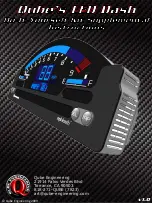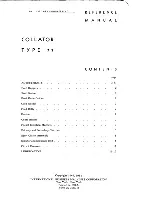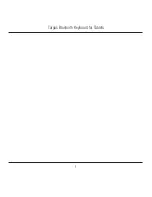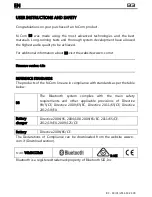
Wiring
Pin Function
1 24 Vdc
2 0 V GND
3 Output/ Ausgang/Sortie; 0 to 10 V
4 Switching output/Schaltausgang/ Sortie a seuil 1 (PNP)
5 Switching output/Schaltausgang/ Sortie a seuil 2 (PNP)
6 Hold / Synchronisation
7 RS232 RxD .. RS485-B
8 RS232 TxD .. RS485-A
1
2
3
4
5
6
8
7
View to solder pins of
connector/ Blick auf
Lötkontakte Kabelstecker
Vue sur les pins à soudée du
connecteur cable
Dimensions/Abmessungen/Dimensions
Hold/synchronisation input
Hold- und Synchronistaionseingang
Entrée d’invalidation/synchronisation
If a measurement is only to take place in a certain
instant, the sensor transmit and receive can be
suppressed by a LOW (0V) at the hold HLD input.
The last calculated distance is stored and output.
During programming the HLD input should also
be connected with the HLD line.
If the sensor is enabled once more (HLD open or
HIGH), a new output occurs after completion of a
measurement cycle.
Synchronisation
To avoid mutual interference from several sensors,
these are very simply synchronised by
interconnecting the hold inputs.
Durch Verbinden von /HLD mit GND stellt der
Sensor den Sendebetrieb ein und speichert den
letzten Meßwert.
Synchronisation
Die Geräte der Serie 942 lassen sich
synchronisieren, indem die /HLD- Klemmen
miteinander verbunden werden. Hierbei werden
die Sendebefehle aller synchronisierten Geräte zur
gleichen Zeit ausgelöst. Diese Funktion
ermöglicht den Betrieb von mehreren Sensoren
sehr dicht beieinander ohne gegenseitige
Beeinflussung.
Si une mesure doit être faite seulement à un certain
moment, l’émission et la réception du capteur peuvent
être interrompues en mettant l’entrée d’invalidation
(broche 6) sur LOW
(0 V). La dernière valeur de distance calculée est
mémorisée et affichée à la sortie. Pendant la
programmation, l’entrée d’invalidation doit aussi être
connectée à la ligne d’invalidation.
Si le capteur est activé une fois de plus (HLD ouvert
ou HIGH), une nouvelle valeur apparait aprés la fin du
cycle de mesure.
Synchronisation
Pour éviter les interférences entre plusieurs capteurs,
on peut trés facilement les synchroniser en reliant leurs
entrées d’invalidation.
Programming/Programmierung/Programmation
Programming instruction
Set baudrate fix to 9600,N,8,2 (no parity bit, 8 data bits
and 2 stop bits).
Each command has the same structure: @aBp<CR>
@ Beginning of command, always identical
a Address of sensor; with '#' all sensors will
be addressed
B Command
p Parameter
<CR> End of command CR=ENTER=#13
A more simple way to program the sensor is the use of
the programs
UDSE.EXE
or
SENDE.EXE
available as
accs.
Programmierung
Die Baudrate ist fest auf 9600,N,8,2 (kein Paritätbit, 8
Daten- und 2 Stopbits
Alle Befehle haben den gleichen Aufbau: @aBp<CR>
mit:
@ Befehlseinleitung, immer gleich
a Adresse des Sensors, mit ‘#’ werden
alle Sensoren angesprochen.
B Befehl, immer in Großbuchstaben
p Parameter, immer eine Dezimalzahl im
ASCII Format
<CR>Ende des Befehls <CR>=ENTER=#13
Eine einfachere Art der Programmierung erfolgt mit den
Programmen
UDSD.EXE
und
SENDD.EXE
die als
Zubehör verfügbar sind.
Instructions de programmation
Fixer le baudrate à 9600,N,8,2 (pas de parité, 8 bits et 2 bits
d’arrêt).
Toutes commandes ont la meme structure
@aBp<CR> avec :
@ Début de commande , toujours identique
a Adresse du capteur; avec '#' adresse de
tous les capteurs
B Commande
p Paramètre
<CR> Fin de commande CR=ENTER=#13
L’utilisation des programmes
UDSE.EXE
ou
SENDE.EXE
(disponibles comme accessoires) représente un moyen plus
simple de programmation des capteurs.
List of Commands/
Befehle:
@#I<CR>
Load
factory setting
into RAM The initial
setting will be written from the EEPROM
into the ROM. Factory settings added to the
following commands are marked with a *
Grundeinstellung laden
Hierbei gehen
die spezifischen Abgleich-Einstellungen
des Werksendtestes nicht verloren! Die
Werkseinstellungen sind im Folgenden
mit * gekennzeichnet.
Charger la configuration par défaut
dans la
RAM La configuration par défaut sera
transmise de l’ EEPROM dans le ROM. Les
configurations par défaut ajoutées au
commandes suivantes sont marquées d’un a *.
@#W<CR>
Write
actual setting into the EEPROM
Speichern der Einstellung
Ecrire configuration utilisée
dans le
EEPROM
@aAp<CR>
@aA97*
Change sensor
address
from A to ASC(Y)
Ändern der
Adresse
von A auf ASC(Y)
Changer l’
adresse
capteur de A vers ASC(Y)
@aSp<CR>
0
≤
p
≤
255 cm @aS200*
Adjustment of the
analogue output range
Steigung des
Analogausgang
einstellen
Régler
la portée de la sortie analogique
@aOp<CR>
0
≤
p
≤
255 cm @aO0*
Offset
of the analogue output
Offset des Analogausganges
Offset
de la sortie analogique
@a1p<CR>
0
≤
p
≤
10000mm @a500*
Set point 1
Schaltpunkt 1
Seuil 1
@a2p<CR>
0
≤
p
≤
10000 mm @a1000*
Set point 2
Schaltpunkt 2
Seuil 2
@aHp<CR>
0
≤
p
≤
255 mm @aH10
Hysteresis set point 1
Hysterese Schaltpunkt 1
Hystérésis seuil 1
@aGp<CR>
0
≤
p
≤
255 mm @aG10
Hysteresis set point 2
Hysterese Schaltpunkt 2
Hystérésis seuil 2
@aUp<CR>
0
≤
p
≤
255 cm @aU15*
Under range
adjustment
Under-Range
Einstellung
Réglage de
la zône de non détection
@aCp<CR>
@aC32*
Cycle
time
adjustment
Messzyklus
einstellen
Réglage de
la fréquence de cycle
@aXp<CR>
0
≤
p
≤
255 @aX238*
Offset
adjustment
Offsetabgleich
Réglage de
l’offset
@aRp<CR>
0<p<256 @aR30*
Over range counter
Over-Range Austastung
Compt. hors détection
@aTp<CR>
0
≤
p
≤
255 @aT52*
Fail echo suppression
counter
Störunterdrückung
Compt.
de
suppression de fausse impulsion
@aD<CR>
Read out sensor setting
Parametertabelle
auslesen
Lire la configuration du capteur
A<CR>
Read out of one Distance Measurement
Einzelne Meßwerte abrufen
Lire la distance simple par RS interface
@aMp<CR>
0
≤
p
≤
255 @aM1*
Mode Register
Mode Register
Registre de mode
Mode Register/ Registre de mode
Value of parameter p is between 0 and 255.
It is determined by combination of following bits.
Der Wert des Parameter p liegt zwischen 0 und 255. Er wird
durch die Kombination folgender Bits bestimmt:
La value du paramètre p est située entre 0 and 255. Elle
est déterminée par la combinaison des bits suivants :
Name.
Bit
Val.
Function ( 1 )
Function ( 0 )
Funktion(1)
Function ( 0 )
Fonction ( 1 )
Function ( 0 )
SET
7
128
Switching output
window
Normal switching
Fensterfunktion Schaltausg.
Normale Schaltfunktion
Sorties à seuils fenêtre
Fonction normale
SAO
6
64
Serial output disabled
Serial output enable
Serieller Ausgang
freigegeben
Seriell. Ausgang
gesperrt
Sortie série désactivée
Sortie sér. activée
HFT*
5
32
Special triggering Echo
Normal triggering
Spezielle Echo- Auswertung
Normale Auswertung
Déclenchmnt spécial écho
normal
INV
4
16
Neg. slope analog output Positive slope
Neg. Kennlinie
Ana.ausgangs
Positive Kennlinie
Pente négative
Pente positive
MWO
3
8
Output no mean value With mean value
Keine Mittelwertbildung
Mit Mittelwertbildung
Sans valeur moyenne
Avec moyenne
NC2
2
4
Switch 2 is NC
Switch 2 is NO
SP 2 hat NC Charakter
NO Charakter
Seuil 2 est NC
Seuil 2 est NO
NC1
1
2
Switch 1 is NC
Switch 1 is NO
SP 1 hat NC Charakter
NO Charakter
Seuil 1 est NC
Seuil 1 est NO
BCD
0
1
Digital output in BCD
Digital output HEX
Digitalausgang in BCD
in HEX
Sortie numérique en BCD en HEX
MANUAL • Subject to alteration! Version:
October 2004
ipf electronic gmbh • Rosmarter Allee 14 • 58762 Altena
│
Tel +49 2351 9365-0 • Fax +49 2351 9365-19
│
[email protected] • www.ipf-electronic.com
2




















